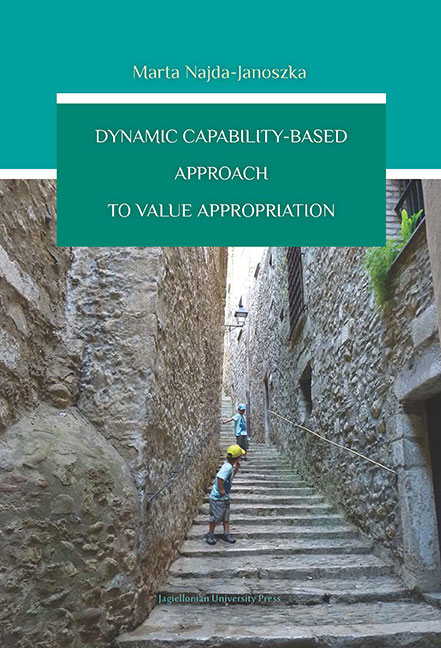Book contents
4 - Dynamic capability-based framework of value appropriation
Published online by Cambridge University Press: 20 December 2017
Summary
Given that value creation and value appropriation are conceived as intertwined yet distinctive processes, the development path of the former may not necessarily comply with the course of action exhibited by the latter one. According to the discussion presented in the Chapter 2 of this study value capture involves a multilevel, complex pattern of actions that extend far beyond the single point of transaction (Coff, 2010). In fact, as emphasized by Moran and Ghoshal (1997, p. 7), any specific resource deployment should be preceded not only by the existence of a resource and opportunity itself but also by the reasonable expectation “for some value to be realized from the deployment.” Hence, it has become a common recognition that receiving and retaining value streams involves a wide range of resources and organizational capabilities developed across organizational functions (Fischer, 2011). Recalling that organizational capabilities are path dependent sets of routines (and their contextual requisites) brings in the issue of organizational inertia. On the one hand this experience based, path-dependent nature of operational capabilities used for value appropriation provides an internal consistency and stability of organizational behavior, on the other hand as self-enforcing characteristics cannot be easily modified and thus may hamper adaptation of an organization to the dynamics of the environment. Changes in technology, demand, legal regulations, competition or internal pressures generated by changes in the organizational structure, human capital, available resources, value creation processes, may require substantial reconfiguration of resources and existent practices of value capture to ensure not only growth but also survival of an organization. Therefore, although it appears quite challenging, firms facing internal and external pressures toward change need to respond to them by altering or introducing new ways for capturing value i.e. extend, modify, retrench or cease various elements of this complex pattern of activity (Katkalo et al., 2010). Guided by the understanding of the dynamic capabilities perspective adopted in this study it can be stated that an organization may generate necessary alternations by using dynamic capabilities or by turning to other plausible ways for accommodating change based on ad hoc problem solving. Given that capability development and deployment involves substantial cognitive, managerial and operational costs, it can be assumed that dynamic capabilities are not automatically involved in every reaction to environmental change and a decision on using a particular mechanism for accumulating change depends on the cost-benefits analysis in a given context.
- Type
- Chapter
- Information
- Dynamic Capability-Based Approach to Value Appropriation , pp. 111 - 128Publisher: Jagiellonian University PressPrint publication year: 2016



